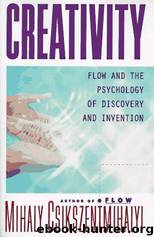Creativity: flow and the psychology of discovery and invention by Mihaly Csikszentmihalyi

Author:Mihaly Csikszentmihalyi
Language: eng
Format: mobi
Tags: Non-fiction, etc.), Psychology, Creative Ability, Creativity, General, Family & Relationships, artistic, Self-Help, Creation (Literary, Creative thinking
ISBN: 9780060928209
Publisher: New York : HarperPerennial, 1997, 1996.
Published: 1997-01-15T21:40:25.342000+00:00
PART III
DOMAINS OF CREATIVITY
TEN
THE DOMAIN OF THE WORD
Now in this third part of the volume we look more closely at specific domains of creativity. For as chapter 4 showed, even though there are important common features to the creative process, in order to really see what happens in its concreteness we have to consider each domain separately. At a very abstract level, creativity in physics and poetry shares common traits; but such a level of abstraction misses many of the most interesting and vital aspects of the process. Therefore, this chapter and the next two present a number of cases from the same domain, in order to get a more detailed understanding of what is involved in producing a cultural change.
We start with a brief analysis of the goals and working methods of five writers—three poets and two novelists. Starting with writers makes sense because of all the cultural domains literature may nowadays be the most accessible. It is not easy to describe how theoretical physicists work in a way that is understandable to laypersons (among whose ranks I count myself). But we all read stories, we all write to a certain extent, so the craft of professional writers is not abstruse. However, even within the somewhat homogeneous domain of literature there are large differences. Not only the obvious difference between poet and novelist, but within each of these subdomains there are innumerable variations in terms of which part of the long tradition of poetry, for instance, the writer draws on; whether the writer works in a classical mode or as an experimentalist; what genre he or she prefers, and so on. Despite the fact that in the last analysis each writer is unique, the five sketches that follow give a flavor of what is involved in literary creation. But before getting down to cases, it may be useful to consider the more general question: Why are we interested in literature?
Among the oldest symbolic systems in the world are those organized around the content and the rules of language. The first narrative stories telling of real or imaginary events, the myths and campfire tales of our ancestors, extended dramatically the range of human experience through imagination. The rhyme and meter of poetry created patterns of order that must have seemed miraculous to people who had yet scarcely learned to improve on the precarious order of nature. And when the discovery of writing made it possible to preserve memory outside the fragile brain, the domain of the word became one of the most effective tools and greatest sources of pride for humankind. Perhaps only art, dance, and music are more ancient; the beginnings of technology and arithmetic probably contemporaneous.
What makes words so powerful is that they enrich life by expanding the range of individual experience. Without stories and books, we would be limited to knowing only what has happened to us or to those whom we have met. With books we can join Herodotus during his travels to Egypt, or be
Download
This site does not store any files on its server. We only index and link to content provided by other sites. Please contact the content providers to delete copyright contents if any and email us, we'll remove relevant links or contents immediately.
Rewire Your Anxious Brain by Catherine M. Pittman(18644)
Talking to Strangers by Malcolm Gladwell(13351)
The Art of Thinking Clearly by Rolf Dobelli(10458)
Mindhunter: Inside the FBI's Elite Serial Crime Unit by John E. Douglas & Mark Olshaker(9325)
Becoming Supernatural by Dr. Joe Dispenza(8204)
Change Your Questions, Change Your Life by Marilee Adams(7762)
Nudge - Improving Decisions about Health, Wealth, and Happiness by Thaler Sunstein(7694)
The Road Less Traveled by M. Scott Peck(7594)
The Lost Art of Listening by Michael P. Nichols(7497)
Mastermind: How to Think Like Sherlock Holmes by Maria Konnikova(7325)
Enlightenment Now: The Case for Reason, Science, Humanism, and Progress by Steven Pinker(7307)
Win Bigly by Scott Adams(7184)
The Way of Zen by Alan W. Watts(6604)
Daring Greatly by Brene Brown(6504)
Big Magic: Creative Living Beyond Fear by Elizabeth Gilbert(5757)
Grit by Angela Duckworth(5609)
Ego Is the Enemy by Ryan Holiday(5418)
Men In Love by Nancy Friday(5234)
The Laws of Human Nature by Robert Greene(5182)
